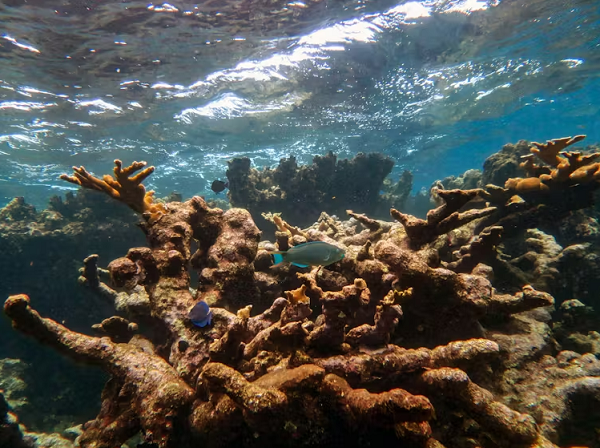

In layman’s terms, Chris Perry, Christopher Cornwall, and Lorenzo Alvarez-Filip share information about a new study. See The Conversation (17 September 2025) for full article, videos, and photos.
Caribbean coral reefs are sounding the alarm. These ecosystems, which protect millions of people and sustain billion-dollar industries, are on the verge of collapse – not in some distant future, but within our lifetimes.
We have been studying reefs across the western Atlantic region for more than 25 years to understand the ways reef communities are changing, and how this affects their ability to keep growing.
Our new research shows that reefs across the region are now reaching a point where they will no longer keep pace with sea-level rise. This will affect the ability of reefs to buffer coastlines from wave energy, threatening nearshore habitats.
Unless global warming by 2100 is limited to below 2°C (relative to pre-industrial levels), our study suggests nearly every reef will stop growing – and most will start eroding by the end of this century. The consequences for coastal communities will be severe.
Coral reefs aren’t just attractive dive sites. They are living breakwaters: dampening wave energy, reducing storm damage, and creating sheltered environments for habitats like seagrass meadows that serve as fish nurseries. Lose the reef structure and you don’t just lose biodiversity – you expose shorelines, weaken food security, and put lives at risk.
Globally, reefs protect an estimated 5.3 million people and coastal assets worth more than US$100 billion (£74 billion) every decade. Even if reef decline seems like a distant issue for many, the changes taking place now – and the consequences of these changes in future – are illustrative of what happens when regional ecosystems pass thresholds for their persistence.
Many of the world’s coastal ecosystems, which also provide protection and habitable land, are equally threatened – with implications for us all.
Historically, Caribbean reefs grew upward at rates averaging 4–5 millimetres a year – fast enough to keep up with past sea level changes. Our research shows that their average growth rate has slowed to less than 1 millimetre per year, or just a centimetre each decade.
Reefs have been battered for decades by overfishing, disease outbreaks and pollution. Climate change is accelerating their decline; a trend we have been monitoring at many reef sites. Unprecedented levels of thermal stress occurred in 2023 and 2024 across the western Atlantic, leading to widespread coral bleaching.
Rising ocean temperatures can kill corals outright, slow the growth of surviving corals and increase coral vulnerability to disease, while simultaneously driving sea levels higher.
This “double squeeze” means reefs are moving in the wrong direction. Instead of building upward as sea levels rise, many are starting to erode. Our new modelling shows that by 2040, more than 70% of Caribbean reefs will be in states where their structures are starting to erode away. If warming passes 2°C, that figure rises to over 99% by 2100. [. . .]
We then combined this with ecological data collected during diving surveys to determine the types and abundance of corals that contribute to reef building. These surveys were conducted on more than 400 modern reef sites across the region. We collected data on corals and other marine species, such as parrot fish and urchins, that contribute to reef building. [. . .]
By 2060 under such warming, reefs in the region are likely to see an extra 30–40cm of water above today’s levels. By 2100, the figure could reach in excess of 70cm and would exceed one metre under higher warming trends. The consequences will be stark: reduced storm protection, faster shoreline erosion, disrupted ecosystems and damaged infrastructure.
We also investigated whether reef restoration could reverse these trends. Efforts to plant corals and breed heat-tolerant strains are under way and offer some hope. In small areas, with enough resources, they have been shown to boost growth and recovery.
However, the scale of the problem – thousands of square miles of reef – means restoration alone is very unlikely to be enough. Cutting emissions is critical to halting declines in reef growth, and essential to give restoration efforts any chance. [. . .]
For full article, see https://theconversation.com/caribbean-coral-reefs-are-running-out-of-time-to-keep-up-with-rising-seas-new-study-265203
Also see Perry, C.T., de Bakker, D.M., Webb, A.E. et al. “Reduced Atlantic reef growth past 2 °C warming amplifies sea-level impacts.” Nature (2025). https://doi.org/10.1038/s41586-025-09439-4
[Photo above by Lauren T Toth, CC BY-NC-ND: A degraded reef crest in the Caribbean island of St Croix.]
In layman’s terms, Chris Perry, Christopher Cornwall, and Lorenzo Alvarez-Filip share information about a new study. See The Conversation (17 September 2025) for full article, videos, and photos. Caribbean coral reefs are sounding the alarm. These ecosystems, which protect millions of people and sustain billion-dollar industries, are on the verge of collapse – not in





